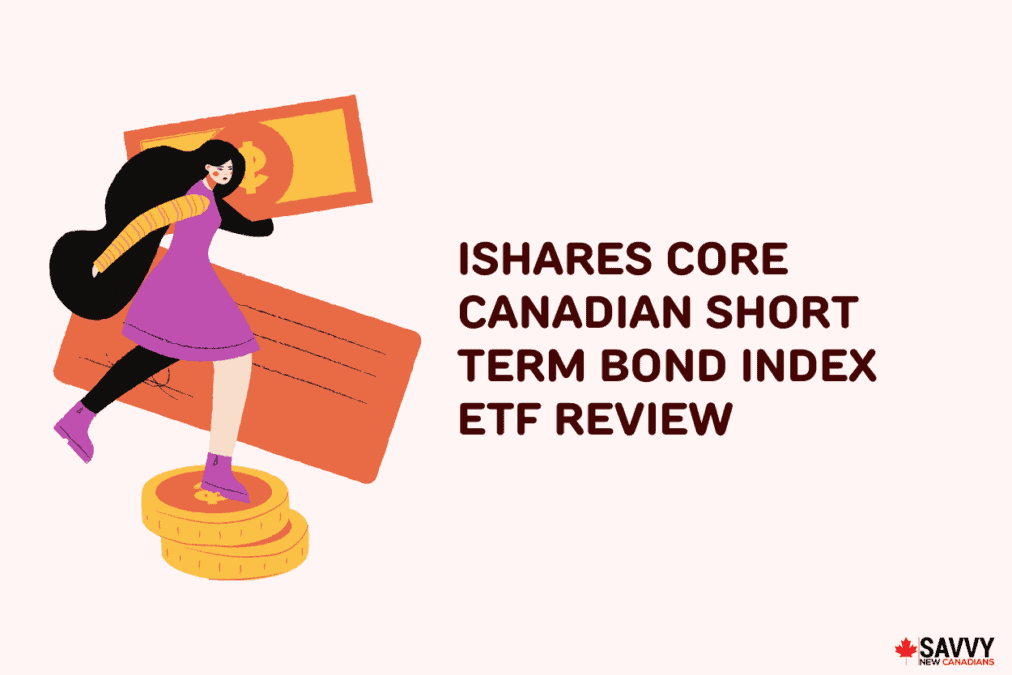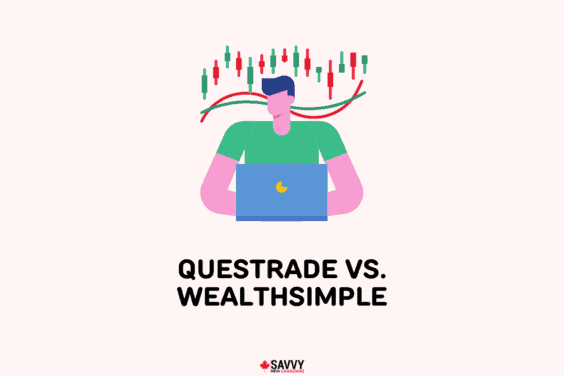Exchange-Traded Funds (ETFs) like XSB allow Canadian investors to diversify their portfolios using a basket of fixed income assets.
Compared to traditional mutual funds, ETFs have much lower management expense ratios (MER). This can help sustain higher gains over the long term.
Stocks and ETFs like XSB can easily be purchased on a discount brokerage in Canada like Wealthsimple Trade or Questrade. Both of these platforms offer no commission purchases of ETFs.
This XSB ETF review article will cover XSB’s holdings, performance, fees, peer comparison, pros and cons, and how to purchase it in Canada.
What is XSB?
XSB is the Blackrock iShares Core Canadian Short Term Bond Index ETF that trades on the Toronto Stock Exchange.
The fund started trading on November 20, 2000, and is designed to track the benchmark FTSE Canada Short Term Overall Bond Index.
XSB holds low-cost, investment-grade bonds that offer short-term maturities that range from 1 to 5 years.
It intends to be a stable, fixed-income asset that pays regular monthly distributions with a low-interest rate risk.
Here are some key facts for XSB as of June 2023:
- Inception date: November 20, 2000
- Number of holdings: 574
- Weighted Average YTM: 4.69%
- Weighted Average Coupon: 2.64%
- Weighted Average Maturity: 2.93 years
- Management fee: 0.09%
- MER: 0.10%
- 12-month trailing yield: 2.45%
- Distribution yield: 2.63%
- Distribution frequency: Monthly
- Eligible accounts: RRSP, TFSA, RRIF, TFSA, DPSP, RDSP
XSB Holdings
Since XSB is a short-term ETF bond, it primarily holds Canadian-issued bonds with a maturity of 1-5 years.
XSB is an all-bond ETF which gives it a low-risk rating, and it can be a long-term core holding of your portfolio.
The fund holds a total of 574 different bonds as of June 2023. Here are the top 10 issuers of these bonds:
| Bond Issuer Name | Weighted Allocation in XSB |
| Government of Canada | 27.81% |
| Canada Housing Trust NO.1 | 13.98% |
| Province of Ontario | 8.63% |
| Royal Bank of Canada | 3.71% |
| Province of Quebec | 3.45% |
| The Toronto Dominion Bank | 3.40% |
| Bank of Montreal | 2.76% |
| Bank of Nova Scotia | 2.65% |
| Canadian Imperial Bank of Commerce | 2.50% |
| Province of Alberta | 2.17% |
And here are the top 10 bond holdings XSB by individual weighted allocation:
| Bond Issuer Name | Weighted Allocation in XSB |
| Government of Canada | 2.58% |
| Government of Canada | 1.97% |
| Government of Canada | 1.93% |
| Government of Canada | 1.89% |
| Canada Housing Trust NO.1 144A | 1.87% |
| Government of Canada | 1.85% |
| Government of Canada | 1.83% |
| Government of Canada | 1.66% |
| Province of Ontario | 1.65% |
| Government of Canada | 1.63% |
And here are the maturities for XSB by the percentage of fund allocation:
| Time to Maturity | % of XSB Market Value |
| 0-1 Years | 0.00% |
| 1-2 Years | 30.10% |
| 2-3 Years | 25.36% |
| 3-5 Years | 43.47% |
| 5-7 Years | 0.25% |
| 7-10 Years | 0.47% |
| 20+ Years | 0.21% |
| Cash and Derivatives | 0.14% |
Finally, here is the credit quality breakdown of the bond holdings in the XSB ETF:
| Credit Type | % of XSB Market Value |
| AAA | 47.79% |
| AA | 20.96% |
| A | 18.93% |
| BBB | 11.70% |
| Cash and/or Derivatives | 0.14% |
| Other | 0.48% |
XSB Returns and Performance
Fixed-income ETFs like XSB are not generally held for long-term capital growth; rather they are attractive for stable price performance and regular distributions.
Since its inception, XSB has had an annual average return of 3.40% and a cumulative return of 111.62%.
Here is how XSB has performed compared to the benchmark FTSE Canada Short Term Overall Bond Index:
| YTD | 1 Month | 3 Month | 6 Month | 1 year | 3 year | 5 Year | 10 Year | Inception | |
| XSB Total Return | 2.23% | 0.44% | 0.88% | 2.98% | 2.01% | -1.09% | 6.91% | 13.73% | 111.62% |
| Benchmark Total Return | 2.27% | 0.44% | 0.90% | 3.02% | 2.08% | -0.81% | 7.38% | 15.53% | 112.89% |

XSB Fees
As with most fixed-income ETFs, XSB has relatively low management fees for its holders.
The management fee for XSB sits at 0.09% and the MER is 0.10%.
This is significantly lower compared to what you pay the average equity mutual fund manager in Canada (1.98%).
XSB offers Canadian investors a low-cost way of having exposure to the Canadian short-term bond market.
This iShares ETF provides relative portfolio stability as well as regular, monthly distributions that provide a nice steady cash flow.
It has much lower management fees and MER than the standard mutual fund fees in Canada.
With that being said, fixed-income assets do not provide much in terms of long-term capital growth.
An all-bond ETF shouldn’t be the only holding in your long-term portfolio. Diversifying with stocks or equity ETFs for capital growth is one way to diversify your investments.
XSB vs. VSB
VSB is the Vanguard Canadian Short-Term Bond Index ETF that also trades on the Toronto Stock Exchange.
The ETF has slightly higher fees, with a management fee of 0.10% and an MER of 0.11%.
The Vanguard Canadian Short-Term Bond Index ETF holds a total of 502 bonds with an average maturity term of 2.8 years.
VSB pays a monthly distribution frequency with a 12-month trailing yield of 2.38%. Learn more in this detailed review.
XSB vs. ZAG
ZAG is the BMO Aggregate Bond Index ETF established in January 2010. It trades in CAD on the Toronto Stock Exchange.
This ETF has lower fees than XSB, with a management fee of 0.08% and an MER of 0.09%.
It holds a total of 1,486 bonds with a Weighted Average Term of 9.96 years.
ZAG pays a monthly distribution frequency with an annualized distribution yield of 3.52%.
XSB vs. XSH
XSH is another Blackrock iShares ETF. It is the iShares Core Canadian Short-Term Corporate Bond Index ETF and trades on the Toronto Stock Exchange.
The fees for this ETF are the same as for XSB, which is a management fee of 0.09% and an MER of 0.10%.
The fund holds a total of 449 bonds with a Weighted Average Maturity of 3.31 years.
XSH also pays a monthly distribution with a 12-month trailing yield of 3.12%.
You can easily purchase XSB using Questrade or Wealthsimple Trade.
Questrade
Questrade is an online discount brokerage that was established in 1999. It offers trading for most assets, including stocks, ETFs, bonds, mutual funds, options, and GICs.
ETF purchases are free for Questrade users, although there is a min. $4.95 fee for selling those ETFs.
Questrade

Trade stocks, ETFs, options, FX, bonds, CFDs, mutual funds, etc.
Get $50 trade credit with $1,000 funding
Low and competitive trading fees
No quarterly inactivity fees
Access to advanced tools and trading data
Top platform for advanced traders
Transfer fees waived
Wealthsimple Trade
This Toronto-based discount brokerage is majority-owned by the Power Corporation of Canada and was founded in 2014.
It provides commission-free trading for stocks, ETFs, mutual funds, and other investment assets. Wealthsimple offers easy-to-use and intuitive apps for both desktop and mobile devices.
Wealthsimple Trade

Trade stocks, ETFs, and options
Excellent trading platform for beginners
Deposit $150+ to get a $25 cash bonus
Transfer fees waived up to $150
Qtrade
Qtrade is another discount brokerage platform based out of Vancouver, British Columbia.
This platform provides lower-cost investment fees for assets like stocks, ETFs, and mutual funds.
It offers commission-free trading for a list of specified ETFs. While XSB is not on this list, other iShares Bond ETFs like XQB, XIG, XGB, and XRB are available.
Qtrade

Up to $150 sign-up bonus
Trade stocks, ETFs, options, bonds, etc.
Excellent platform for newbies and seasoned investors
Competitive trading fees
Excellent customer service
Is XSB a Good Buy?
As a fixed-income ETF, XSB could have a role in a diversified portfolio as a stabilizer with steady monthly cash flow through distributions.
Short-term bonds actually show less volatility and have less sensitivity to changes in interest rates.
XSB has a proven record of returns on investment and is an excellent holding during times of market volatility and negative sentiment.
XSB ETF Review FAQs
In terms of stable monthly income and minimizing capital losses, XSB is a good investment for Canadian investors. Investors should not expect high levels of long-term capital growth from XSB, but rather more of a hedge to market volatility.
Yes! These dividends are known as distributions and are paid out on a monthly basis. Monthly distributions are one of the more appealing features of fixed-income ETFs like XSB. XSB has a distribution yield of 2.63% on an annualized basis and a 12-month trailing yield of 2.45%.
Bond ETFs can be purchased like any other exchange-traded funds or stocks. Simply search for the ticker symbol of the ETF, like XSB, and specify the number of shares you wish to purchase.
Buying bond ETFs on a discount brokerage like Wealthsimple Trade or Questrade will help save on trading fees and can make a difference when it comes to long-term gains.
Related: Safe Investments With High Returns.






